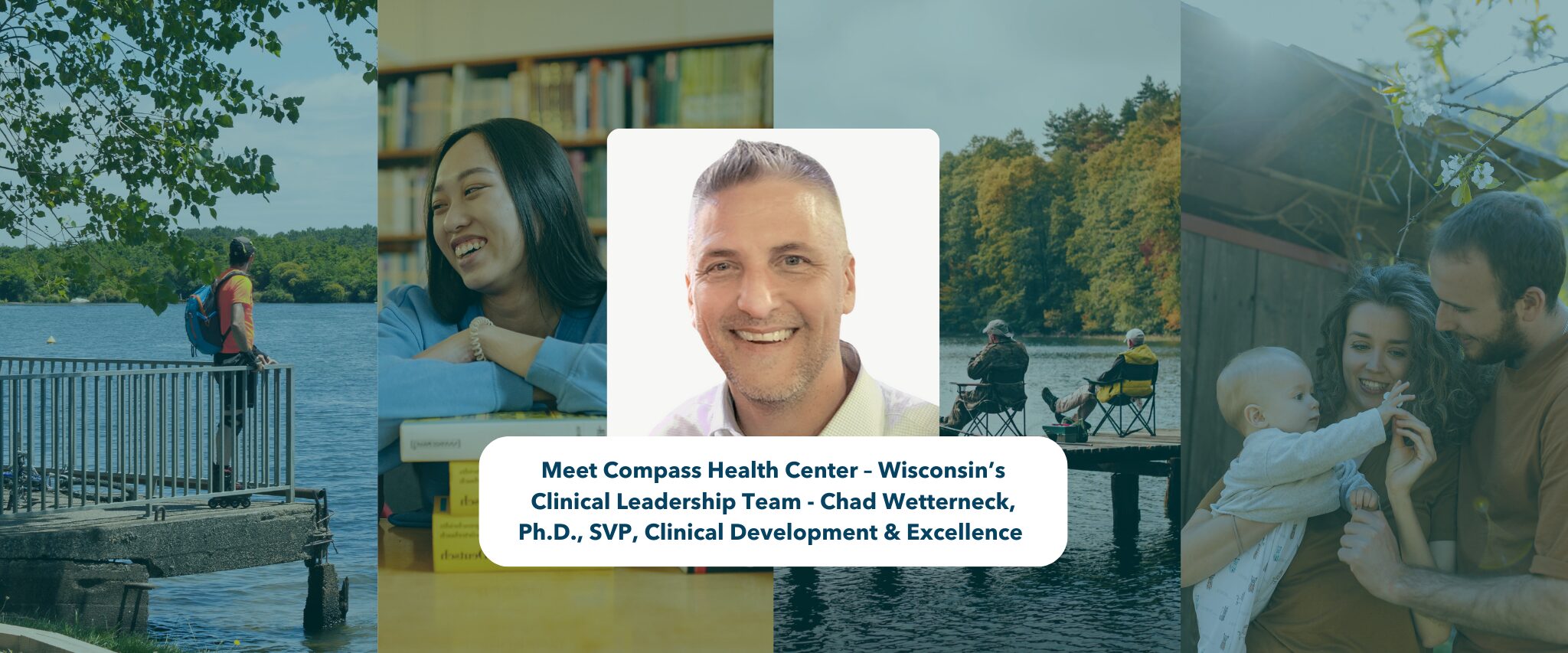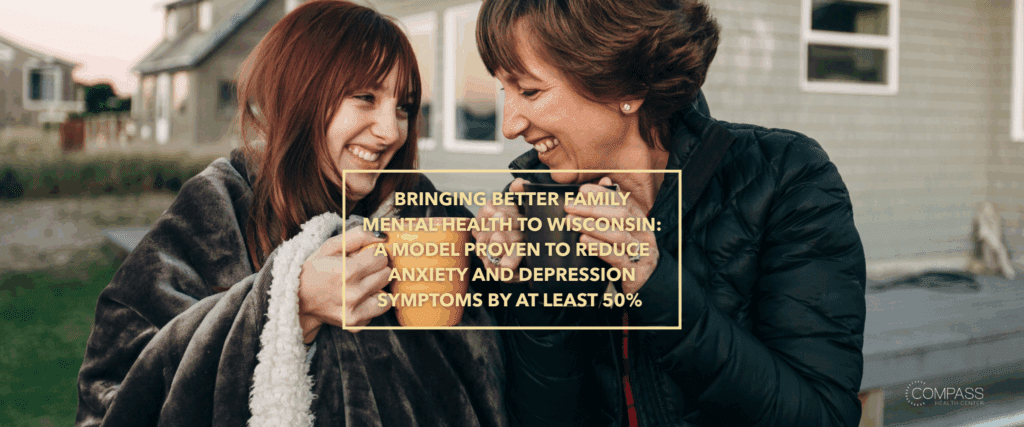
Expert Insights: Chad Wetterneck, Ph.D. SVP, Clinical Development & Excellence
A Conversation with Wisconsin OCD and Trauma Specialist: On what it means to offer care that’s as personal as it is effective
When someone is struggling with their mental health, knowing where to turn or what kind of care is even available can feel overwhelming. For many people, weekly therapy isn’t enough. At the same time, hospitalization might not be the right fit either. That’s where Compass Health Center comes in.
As Compass expands into Wisconsin, Chad Wetterneck, Ph.D., SVP, Clinical Development & Excellence, is helping lead the mission. A clinical psychologist with roots in the state and decades of experience, Dr. Wetterneck has spent his career building programs for people living with complex mental health challenges, including OCD, trauma, substance use, depression, and anxiety. What stands out just as much as his clinical expertise is how grounded he is in his values. He talks openly about the importance of nurturing, of integrity, and of creating the kind of environment where people feel safe enough to try something different.
In this conversation with Britt Teasdale, Compass’s Associate Director of Brand and Content, Dr. Wetterneck shares what drew him to this work, what sets Compass apart, what he hopes to build for the Wisconsin community, and the transformative role of specialized mental health care in helping people move towards values-aligned lives.
This interview has been lightly edited for grammar and flow. The speaker’s original meaning and intent have not been changed.
—
Q&A
Britt Teasdale (BT):
Tell me a little about your background and what brought you to Compass.
Chad Wetterneck, Ph.D. (CW):
Ever since I joined my PhD program as a student, I got very interested in a couple of clinical modalities and ways of studying things. I was exposed to evidence-based therapies. I liked the fact that we were studying them in a scientific approach and felt like that would move the field forward because it gives us a way to standardize and define treatment, and study it to make sure they’re actually having the positive effects we assume we’re having but weren’t measuring all the time.
I also developed an affinity for some of the same treatment modalities that Compass uses. I was mainly trained in cognitive behavioral therapy, acceptance and commitment therapy, and DBT. So it was a natural fit when I saw what Compass did, because those are my specialty areas.
Background-wise, I’ve had a two main jobs before this, and the first one was as a professor. I enjoy helping people learn how to help others. I’ve defined my values as a professional along the way, and one of my biggest values is being nurturing. It’s something that goes across many areas of my life, but I found in both mental health and teaching settings that nurturing allowed me to flourish and feel as though I was on the right path.
At some point, I recognized that I wanted to have even more direct impact with patients. I was previously a clinical director and I had the opportunity to design my own treatment program and grow it from a single partial program to 15 partials, IOPs, and a residential program.
I was responsible for all the training, research, and evidence-based care that was done within that program, representing it to the community and the scientific community as well. I found that I wanted to do more than just work in one area. The program I designed focused mainly on PTSD and trauma, but I also had expertise in OCD and related conditions, had treated folks with mood and general anxiety concerns, even comorbid eating concerns, and worked quite a bit in the substance use treatment area. I wanted to be able to affect change across multiple diagnostic areas.
When interviewing at Compass, I felt they were looking to see if I was a person of high integrity and someone who would fit well with their culture, which was already positive and supportive. That was just as important to them as being an expert in certain treatment areas and diagnostic areas.
BT:
It sounds like that nurturing quality you spoke of connects to wanting to effect change in the work you do. Could you give an example of a time you really felt you affected change, whether for a specific person or a program you built?
CW:
I have a file drawer full of folders with thank-you cards from patients who have come through any of the programs I’ve worked in or overseen, as well as from practicum students and therapists I trained and supervised. I’m trying to think if there’s one that stands out, but at some point I asked my previous workplace how many people had gone through the program. Over 10 years, it was more than 7,000 people.
To think about 7,000 people going through programs I designed, when there were very few programs available to treat these conditions, means 7,000 people likely received substantial to high symptom reduction and could engage in life again, or maybe for the first time. I’ve heard many patients say, “I never thought I’d be able to lead a life where I had choice over what I did and actually felt happy. I didn’t think that was possible. Going through your program allowed me to realize it was a possibility.”
When you hear that from someone who has had repeated childhood sexual or physical trauma—usually both—and they’re in their 40s or 50s or older, knowing that’s how they lived for 30 to 40 years, it’s pretty powerful.

BT
How did you identify your primary values?
CW:
Through acceptance and commitment therapy, one of our core modalities at Compass. During graduate training, I attended multi-day workshops that required us to explore our values across life domains—relationships, work, self-care, spirituality—and create plans to pursue them. It’s almost like going through part of the therapy yourself, so you understand exactly what patients experience.
BT:
Besides nurturing, do you live by any other core values?
CW:
They vary by life area, but nurturing shows up in my friendships, family, teaching, and supervision. I review my values list once or twice a week, choosing something to commit to for that day. Sometimes it’s listening more intently, sometimes it’s following through on commitments.
Values work is powerful.
BT:
Why did you choose PHP and IOP as your primary focus?
CW:
There are probably two reasons. One was practical. A couple of my first practicum experiences were working in a residential and then an IOP-type setting, treating severe anxiety disorders and mainly treating obsessive-compulsive disorder. While there was a lot of data I had read in my classes showing we have effective treatment for OCD, there were many people who weren’t benefiting enough from one or two days a week of doing the work. They needed a higher dose.
Similar to why David and Claudia started Compass, they saw a gap from inpatient to returning to once-a-week—or sometimes no—therapy. I wanted to help fill that need. There was almost no research on the effectiveness of these types of programs. I could see that people were getting better, but I also wanted to study it, not just to make our company successful, but to pave the way so others could see how effective this is. Publishing what we do and how we do it could help other places fill the need in their communities, because there are obviously many places Compass is not.
BT:
I know when I started working at Compass eight years ago, I was not familiar with PHP or IOP at all. To learn that there was that option for people who were in that middle ground—more than outpatient, but not necessarily needing to be hospitalized—was like an aha moment. It just makes so much sense, and I wish more people knew about it. What excites you most about bringing Compass to Wisconsin?
CW:
It’s a community I’m very familiar with, so I feel like I understand the needs and know they’re not all being met. Even with other programs that offer similar levels of care, the greater Milwaukee area is large. Many people can’t travel 30 minutes or more each way for treatment, especially daily treatment like ours. We need to bring services closer to where people are.
There are additional barriers. Symptoms affecting their ability to work, do they have a car, can they pay for gas, and do the things that make travel possible. That sounds very practical, but at the heart of it, I care deeply about Southeast Wisconsin. I’ve lived here most of the last 25 years, starting with graduate school and then working in the community; at least 20 of those years in this area.

BT:
Are you originally from Wisconsin?
CW:
More or less. I wasn’t born here, but when I was about one, my family moved to central Wisconsin.
BT:
Okay, and then from there, you moved to Southeast Wisconsin?
CW:
Yes, for graduate school, and then I spent six years in Houston. That’s where I was a professor and director of research for a residential OCD program.
BT:
What would you want individuals and families in Wisconsin unfamiliar with Compass to know first?
CW:
Based on both existing research and our own internal data, if people come, stay, and participate in treatment, they will get better. That’s what most people want to know: “Will I get better?”
We’re not only interested in reducing symptoms. We help develop the idea that you can have values and meaning in life. And how do you pursue them now that maybe your symptoms are going down? It’s about opening up their life. And if they haven’t thought like they’ve had the ability to do that, we want them to be thinking about what do you value? What areas do you want to grow and develop into?

BT:
That poses an interesting question. There’s symptom reduction, but then there’s moving forward. I can imagine for some who’ve been struggling for a long time, the thought of feeling better may be overwhelming. How do we help with that?
CW:
I think part of it is normalizing that when you’ve lived with significant symptoms for a long time, they can help define who you are. And when you wake up and the symptoms are there, and most of your day the symptoms are there, and then they start getting better, we just want to normalize that. When those symptoms start to improve, It’s a transition. It’s like a second leap of faith.
People may have been used to the “known pain” of symptoms. When that’s gone, everything feels unknown. For those who’ve struggled since childhood or adolescence, others may have been defining their life paths while they were managing symptoms. That can make someone feel behind. We normalize that it’s okay not to know what’s next. It’s okay to try new things, see if they work, and accept that you might not be at the same place as peers who didn’t struggle with the same challenges.
BT:
Validation. Can you speak to how our care model helps, both with outcomes and with moving forward?
CW:
Often, patients coming from outpatient care worked with just one part of what we offer, maybe a therapist, maybe a psychiatric provider, and those providers might not have been in regular communication.
We offer all the pieces under one roof: group therapy for skill-building, primary therapists to guide treatment plans, educational specialists for children and adolescents, family therapy, nursing support and psychiatric care. These areas all affect each other, and having them integrated allows us to work as a coordinated team.
There’s a saying that it takes a village to raise a child. I’d say it sometimes takes a village to help someone change their relationship with their symptoms. So welcome, you’ve come to that village and we have all the services under one roof.
BT:
What sets Compass apart from other programs in Wisconsin?
CW:
We live and incorporate our values into treatment. We provide evidence-based therapies and are expanding our evidence-based assessments so we can give real-time feedback to patients, similar to looking at test results in a medical portal.
We have fast admissions with licensed mental health professionals doing the screenings. Not unlicensed staff without a mental health degree. That means we can accurately determine diagnosis and level of care, and refer out if we’re not the right fit.
We also maintain continuity of care. Patients keep the same therapist, psychiatrist, and support staff if they step down from partial to IOP. That’s rare and makes a huge difference in maintaining trust and progress.
BT:
What would you say to someone unsure if they need PHP or IOP?
CW:
If you know you need help, call us. If we don’t think you need PHP or IOP, we’ll tell you and refer you to the right level of care. The same is true if we think you need inpatient or residential care. From the moment you call, our goal is to help you get better, whether that’s with us or somewhere else.
It’s normal not to know exactly what you need. It can feel risky to ask for help. We’ll recommend what we think is best, and if you choose a different path, we’ll still support you.
BT:
What do you hope to build within the Compass Wisconsin community?
CW:
Similar to what I see in some of our other sites. It’s a place where when you walk in, you know that everyone there actually cares about you, is warm, will greet you, will give you space if you need it, and direction if you need it. We want to create an environment that nurtures you, helps you find the direction you want to go, and walks with you as you start down that path.

—
Bios
Dr. Chad Wetterneck, PhD, is the Senior Vice President of Clinical Development & Excellence at Compass Health Center. A national leader in the treatment of OCD, trauma, and co-occurring substance use disorders, Dr. Wetterneck is a faculty member for the International OCD Foundation’s Behavioral Therapy Training Institute (BTTI), a certified trainer in Functional Analytic Psychotherapy, and the author of more than 95 peer-reviewed articles, chapters, and a book. His dedication to evidence-based, compassionate care has earned him national recognition, including the Baylor College of Medicine Research Award, the Marquette University Outstanding Educator in Counseling Award, and ABCT’s Champion of Evidence-Based Psychological Interventions Award. Now, Dr. Wetterneck brings his clinical expertise and values-driven leadership to Wisconsin as Compass Health Center expands its PHP and IOP services across the state.
Britt Teasdale is a writer, photographer, and creative strategist. As Associate Director of Brand Management & Content at Compass Health Center, she has spent nearly a decade shaping narratives that translate complex clinical ideas into stories that resonate, reduce stigma, deepen understanding, and help families access care. She holds an MFA in Creative Nonfiction Writing and began her career in journalism. She co-host of Compass’s forthcoming Podcast, You Only Know What You Know.


